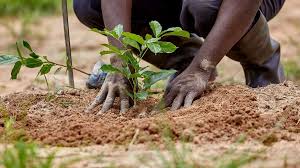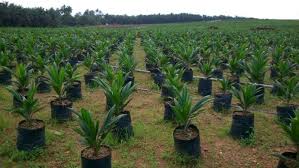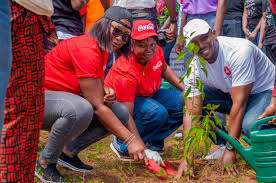![]()
If you’ve landed on this article page, you’re probably searching for a
good business idea—an idea that’s light on the pocket but heavy on
returns, promising both a fulfilling journey and potential profit.
|
How To Start A Lucrative Tree Planting And Reforestation
Business In Nigeria
Tree planting and reforestation refer to the deliberate and
systematic process of establishing trees in areas that have been
deforested or degraded. It involves the planting of tree
seedlings or the natural regeneration of forests to restore
ecological balance and enhance environmental sustainability.
The Tree Planting and Reforestation Business plays a crucial
role in environmental conservation, sustainable development, and
combating climate change in Nigeria and Africa. With increasing
awareness of the importance of forests, there is a growing
demand for tree planting and reforestation initiatives across
the continent.
Statistics reveal the alarming rate of deforestation in Africa,
with Nigeria being one of the most affected countries. According
to the Food and Agriculture Organization (FAO), Nigeria lost an
average of 409,700 hectares of forest annually between 2010 and
2024. This highlights the urgent need for reforestation efforts
to restore degraded landscapes and protect biodiversity.
On a global scale, reforestation has gained significant
attention due to its potential to mitigate climate change. The
United Nations’ Bonn Challenge aims to restore 350 million
hectares of degraded land worldwide by 2030, emphasizing the
role of tree planting and reforestation in achieving sustainable
development goals.
In Nigeria, the Tree Planting and Reforestation Business offers
a promising export opportunity. The country has a diverse range
of tree species suitable for timber production, medicinal
plants, and other forest products. By establishing sustainable
practices and adhering to international forestry standards,
Nigerian businesses can tap into the global market for
sustainably sourced timber, carbon credits, and eco-tourism.
Local data indicates a growing demand for reforestation and
afforestation projects driven by government initiatives,
environmental organizations, and corporate social responsibility
programs. This presents a favorable market for Tree Planting and
Reforestation Business entrepreneurs to provide their expertise
and services.
By investing in tree planting, forest restoration, and
sustainable forestry practices, the Tree Planting and
Reforestation Business in Nigeria and Africa can contribute to
environmental conservation, create employment opportunities,
enhance ecosystem services, and promote the sustainable
development of local communities.
The maturity period of a tree planting and reforestation
business varies depending on the tree species chosen and the
intended purpose of the plantation. Some fast-growing species
may reach maturity within a few years, while others may take
several decades.
It is essential to consider local variations and specific tree
species’ requirements when planning planting and reforestation
activities. Some species may have different optimal planting
seasons or may require irrigation during drier periods.
The demand for planting and reforestation services can be
influenced by factors such as government initiatives,
environmental policies, and market demand for timber, ecosystem
services, or carbon offset projects. It is crucial for
businesses to align their activities with the prevailing market
demands and establish strategic partnerships with relevant
stakeholders.
Obtain Necessary Permits: Ensure compliance with local
regulations and obtain permits required for land use, tree
harvesting, and environmental impact assessments.
Establish Partnerships: Collaborate with relevant stakeholders,
including government agencies, NGOs, local communities, and
landowners, to gain access to suitable land and resources.
Develop Nursery Facilities: Set up a nursery to propagate and
nurture tree seedlings. Ensure proper infrastructure, irrigation
systems, and skilled staff to manage the nursery operations.
Procure Seedlings and Planting Materials: Source quality seeds
or seedlings from reputable suppliers or establish your own seed
collection and propagation processes.
Implement Planting and Reforestation Projects: Develop a
planting schedule, site preparation methods, and tree planting
techniques suitable for the target species and local conditions.
Ensure proper monitoring and maintenance of planted trees.
Implement Sustainable Practices: Incorporate sustainable land
management practices, including soil conservation, water
management, and biodiversity preservation, in your reforestation
projects.
Develop Monitoring and Evaluation Systems: Establish systems to
track the progress of planted trees, measure survival rates, and
evaluate the impact of reforestation efforts on local ecosystems
and communities.
Market and Promote Your Services: Utilize various marketing
channels, such as online platforms, community outreach, and
partnerships, to create awareness about your planting and
reforestation services.
Offer Consulting and Advisory Services: Expand your business by
providing consultancy services to organizations and individuals
interested in sustainable land management and reforestation
projects.
Maintain Relationships with Stakeholders: Nurture long-term
relationships with clients, local communities, and environmental
organizations to foster trust and collaboration.
Continuously Improve and Innovate: Stay updated with the latest
research, technologies, and practices in reforestation and
sustainable land management. Adapt your strategies to changing
market demands and environmental considerations.
How To Plant Trees In Nigeria
Select Suitable Tree Species: Identify tree species that are
suitable for the local climate, soil conditions, and intended
purpose. Consider factors such as growth rate, adaptability, and
ecological value.
Prepare the Planting Site: Clear the planting area of weeds,
grass, and debris. Ensure the soil is well-drained and free from
compacted layers. Amend the soil if necessary to improve its
fertility and structure.
Prepare Seedlings or Saplings: If using seedlings or saplings,
gently remove them from their containers or nurseries. Loosen
the root ball and prune any damaged or circling roots.
Plant the Tree: Place the seedling or sapling in the planting
hole, ensuring that the root collar is level with or slightly
above the ground surface. Backfill the hole with soil, gently
firming it around the roots.
Water the Tree: Immediately after planting, water the tree
thoroughly to settle the soil and eliminate air pockets. Provide
regular watering during the establishment phase.
Provide Support (if necessary): For tall or weak-stemmed trees,
use stakes or other support systems to provide stability and
protect against wind damage. Ensure the support does not
restrict root growth.
Monitor and Maintain: Regularly monitor the tree’s growth, water
needs, and health. Provide necessary care, including pruning,
fertilization, and protection against pests and diseases.
Engage the Community: Involve local communities in tree planting
initiatives. Raise awareness about the benefits of trees and
encourage community participation in tree care and maintenance.
By following these steps, you can ensure the successful
establishment and growth of trees in Nigeria
The sustainable growth of the planting and reforestation sector
in Nigeria and Africa requires a holistic approach that balances
environmental objectives with socioeconomic realities. Continued
research, policy support, and investment in the sector will play
a pivotal role in achieving these goals and realizing the
potential of planting and reforestation for a sustainable
future.
Get our Practical Guide on Tree Planting and Deforestation in
Nigeria. When you partner with us to expand your Tree Planting
And Reforestation Business projects within Nigeria , you can be
confident that you are working with a reliable, knowledgeable,
and experienced consulting team that can help manage the success
of the project. We are dedicated to helping our clients achieve
their goals and grow their businesses.
|







